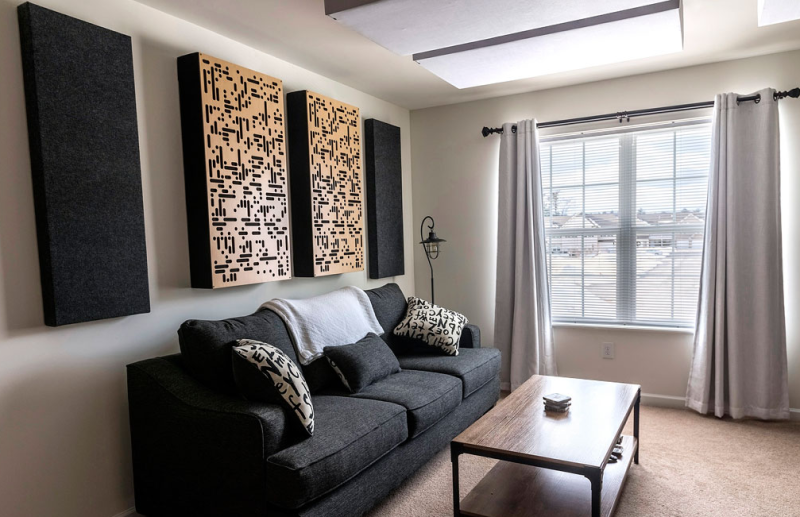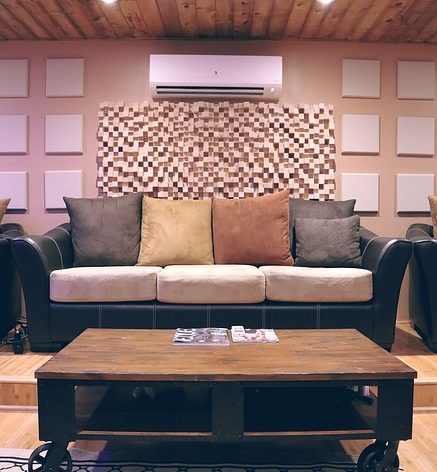Understanding Home Theater Diffusers
We’ve talked about home theater diffusers before. Unfortunately, there is still a lot of confusion about what these room acoustic treatments actually do in your theater. We figured it was about time we addressed this issue. Want to understand home theater diffusers so you can know if they are right for your theater? Read on!
What Are Diffusers?
When people talk about diffusers, they talk about a whole bunch of different products. If you were going to be strict about the definition, they are hard panels, usually hung on walls, with uneven surfaces. The best diffusers are mathematically designed so that their surfaces will reflect any sound that hits them in as many directions as possible. To quote ourselves:
Unlike acoustic panels that seek to reduce sonic reflections, diffusers work completely differently. Rather than reducing the volume of the reflections, using acoustic diffusers in your room actually increases the number of reflections. If your wall is a flat surface (as most are), the sound reflects off it in a predictable and uniform way. Diffusers have a textured surface that is designed to reflect the sound in a non-uniform way.
The idea is that instead of having a strong reflection from one direction, you have a lot of weaker reflections from multiple directions. To be clear, diffusers only work on the very highest frequencies. They do nothing to the midrange or the bass. This is only for treble. So now that we understand how home theater diffusers work, why would we want them?
It’s Not About “Livening Up” The Room
One mantra that is often repeated on Reddit and forums is that people want diffusion to make sure their room doesn’t get “overly dead” from their absorption panels. Absorptions panels do a great job of absorbing the highest frequencies. In order to absorb bass, panels have to be very thick. This means that you might have a lot of panels trying to absorb bass which creates far too much treble absorption. The diffusion, says the Internet, will cure that. It will create more treble to counteract all those panels.

Let’s be clear. That’s not how it works. Diffusers don’t make a room more lively. They don’t add treble. If anything, they reduce treble! By increasing the number of directions the treble reflects, you aren’t adding sound. If anything, you are reducing it. How? By increasing the distance many of those reflections travel. You get a more diffuse sound in your home theater, but diffusers won’t liven up anything.
Let’s Be Clear – You Didn’t Overly-Dampen Your Room
Most people ask about diffusers more as an academic exercise. They are wondering if they might need them. If you have to ask the question, you don’t. That’s just a plain fact. In order to put enough absorption in your room where that room would be “overly deadened,” you’d need to cover every wall with at least 4″ thick panels. You’d walk into the room and it would sound weird. Much like an anechoic chamber, it wouldn’t sound natural.

Even If You Did, Diffusers Aren’t The Answer
Say you went way overboard with your DIY absorption panel project and really did put so many in your room that it sounds weird. Would diffusers help?
No!
Now that you understand how home theater diffusers work, it should be clear that they wouldn’t be the answer to an overly dead room. Instead, you’d simply want less absorption. Your walls do a perfectly fine job of “livening” your room. The problem is that, in this hypothetical situation where you have a room that is overly dead, you’d have to take down some absorption panels to add diffusion. Wow! Suddenly your room sounds better. It must be the diffusion panels, right?
Not a chance. What really made the difference was removing the absorption panels.
But What About…
Whenever we make a controversial statement around here, we get a slew of comments and emails pointing out all the people that disagree with us. Some of them have been in the business for longer (many haven’t) or have larger or more popular platforms. Listen, we can’t help it if they are wrong. If they are saying that a diffuser will liven up your home theater, they either don’t understand how they work, or they haven’t examined more recent testing data. If they can show a measurement where a room showed greater treble with more diffusion without changing anything else in the room, we’ll rethink our position. Until then, we stand by the science.


